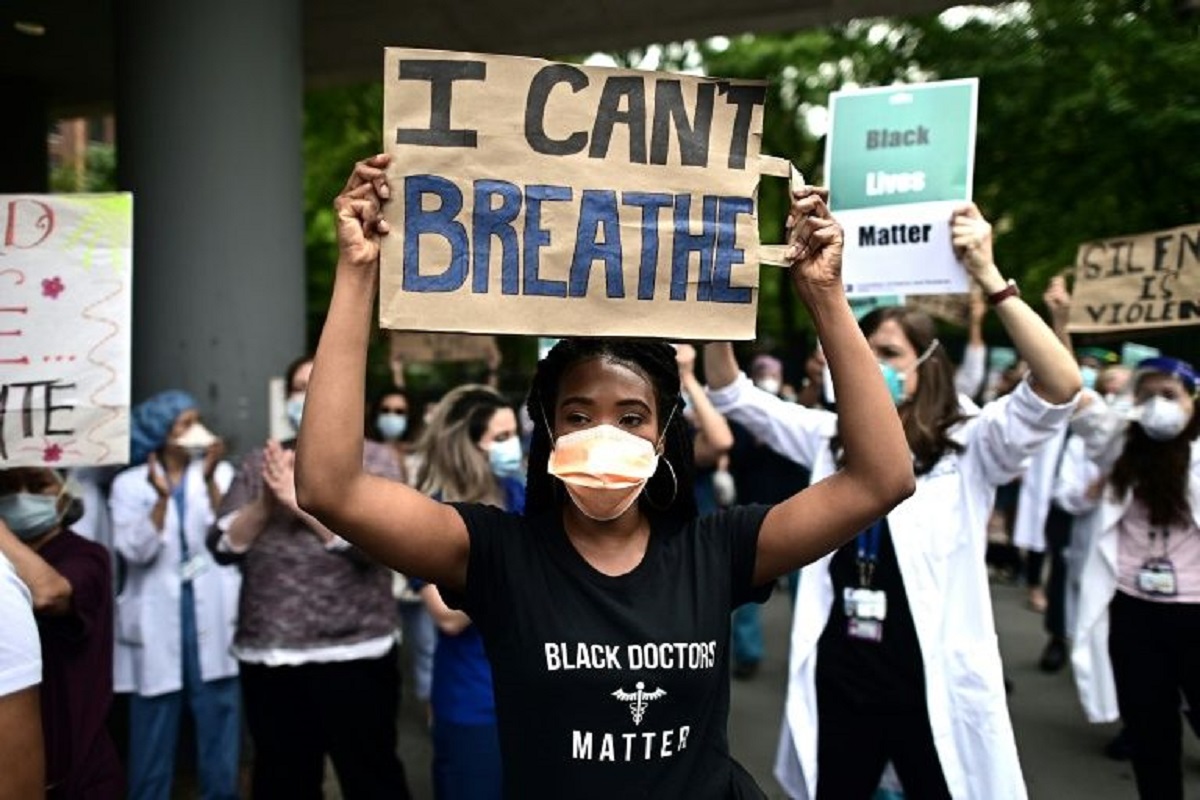Former Minneapolis police officer pleads guilty to manslaughter in George Floyd’s death
A former police officer of Minneapolis, in the US state of Minnesota, pleaded guilty to manslaughter allegedly in the death of George Floyd.
Curricula needs to be bolstered with a more thorough accounting of the African American experience – the good, the bad and the tragic.

Nurses and healthcare workers attend a 'Black Lives Matter' rally in front of Bellevue Hospital on June 4, 2020, in New York City (Photo: AFP)
People worldwide were rightly outraged by the May 25 killing of George Floyd by Minneapolis police officer Derek Chauvin while two other fellow officers restrained Floyd and another stood nearby. The brutal treatment of Mr. Floyd and the taking of his life are intolerable human rights violations by law enforcement that demand both justice and appropriate action going forward.
Going forward, police misconduct must be addressed by a surge in law enforcement funding for carefully targeted programmes to improve police hiring practices, education and training. If there is a silver lining in this episode, let it serve as a clarion call for improved law enforcement hiring guidelines to reduce incidences of employing bad apples who should never be allowed to work in police departments in the first place.
Mr. Floyd’s death must be the impetus for local governments to provide policemen and women with enhanced tolerance and civil rights history education, ethics-based leadership principles and more effective training in key areas such as cultural competency, implicit bias and community policing.
Advertisement
This current gap in understanding must be addressed by allocating resources for study trips and seminars to appropriate institutions that provide meaningful learning opportunities about African American history, the uniquely tragic institution of slavery, the civil rights movement and present day inequities and struggles.
Other needed training areas involve proper restraint tactics that do not impede the breathing of suspects; de-escalation tactics for both conversation and crowd control; measures to combat profiling; requiring officers to intervene when fellow officers engage in unnecessary force; and community policing that demonstrates empathy and builds trust with local residents.
Implementing these changes will require ridding of bad actors and getting the right leaders in place who will not tolerate unethical behaviour. Part of the process will involve departments setting aside the time necessary to get officers off the front lines and into training programmes.
Given the 800,000 plus police officers spread out over 18,000 law enforcement agencies in 50 states, 3,000 counties and tens of thousands of municipalities throughout the U.S., putting into practice these needed training and educational programmes will require sustained focus and commitment.
Yet, these necessary measures will not be enough unless we improve the teaching of history, civics and black studies to future law enforcement officers and participants in our broader society. Today’s youth simply do not have historical knowledge about the mistreatment of African Americans in American history and exhibit glaring ignorance about Martin Luther King’s key contributions.
Along these lines, the National Assessment of American Progress reported in 2010 that only 2 per cent of high school seniors had an elementary understanding of the U.S. Supreme Court’s watershed Brown v. Board of Education decision, and the Southern Poverty Law Center’s 2018 report, Teaching Hard History: American Slavery, found that a dearth of American K-12 teachers have the “comfort”, “understanding” and educational materials to teach about slavery and the civil rights movement.
Just as concerning, the yearly Annenberg Constitution Day Civics Survey found that one in five Americans can’t name a single branch of the U.S. government. We are setting up for failure both law enforcement and private citizens by not inculcating within them an understanding of the basics of American history, civics and the difficult lessons from slavery and the civil rights movement.
Without the tools of education, valuesbased leadership coaching and tolerance training, we lessen prospects for developing police forces equipped with the perspective and empathy needed to do their increasingly complex jobs well and with integrity. This effort starts with our schools. Curricula needs to be bolstered with a more thorough accounting of the African American experience – the good, the bad and the tragic.
In order to properly augment these history and civics programs, educators must be equipped with all of the tools available in teaching today – online courses, virtual programmes, e-books, traveling exhibits, learning apps, video conference symposia, field trips and guest lectures, among other mediums.
During this time of heightened tensions, all levels of leadership – federal, state and local – must partner with communities to recommit to the promise of America. This must involve providing law enforcement with the education and training necessary for learning from the past and for living up to our ideals as a country.
Reinvesting today in the enhanced professional development of our men and women in blue will make headway against police misconduct and help the American people seize this opportunity to make positive change.
(The writer is Director of the Tribal Administration Program at Claremont Graduate University)
Advertisement